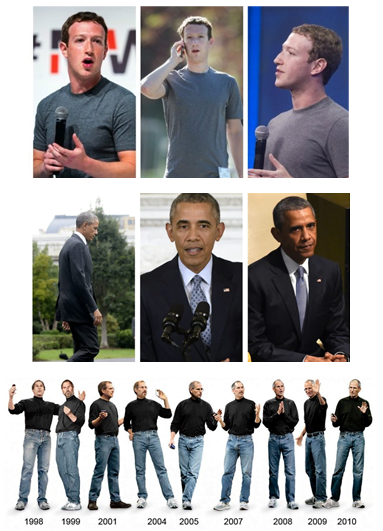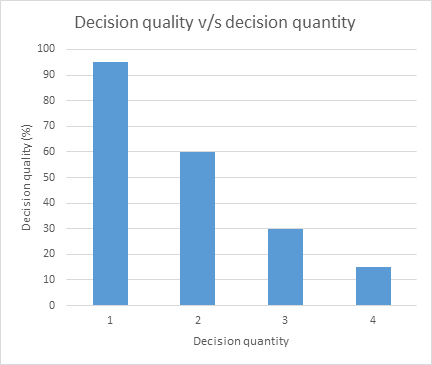Look at the following succession of pictures of some very successful people. Apart from the fact that none of them are part of the “dress to impress” mindset, notice the repetition of outfits:

Simple and boring, right? There is a scientific psychological benefit to not making any decisions on what to wear in a day. What these successful people are trying to avoid is known as “decision fatigue” – the deterioration of good decisions when more decisions are made throughout the day. In today’s blog, we are going to explore decision fatigue by explaining the definition and its implications on how you make choices in your personal and entrepreneurial life. We will conclude with some solutions and strategies to avoid this mental shortcoming.
Decision fatigue definition
Decision fatigue is a cognitive shortcut where good decisions deteriorate as more decisions are being made. The more decisions you make, the worse the quality of decisions you are going to make. When we plot a graph of decision quality against the number of decisions made, we noticed that our decision quality decays with each decision made:

Coined by psychologist Roy F. Baumeister, decision fatigue is caused by a person’s stress and energy levels and how those factors relate to good decision making. When we are fully energized and stress levels are low, we make good decisions. When energy levels lesson throughout the day, so does the quality of our decisions.
Decision fatigue effects
Many have experienced decision fatigue while shopping. You may spend lots of energy making decisions on what to eat for that night, which milk has the furthest expiry date or which peanut butter would the family enjoy the most. By the time you are at the cashiers, your decision muscles are exhausted and you can be easily swayed into picking up the sweets and fizzy drinks – even if you originally walked into the store with the intention of eating healthily.
Decision fatigue may affect your business. Poor quality decisions that do not involve the correct parties may lead to a loss in potential profits. Sometimes, one may completely avoid making decisions as their energy levels cannot sustain the brain making taxing decisions. Decisions that are made late in the day based on which is easier to do may be a quick fix solution, however it may cost the business potential profits over time. Here are some risk factors that may cause fatigue sooner rather than later:
- Making many stressful decisions
- Making many complicated decisions
- Making decisions late in the day, or just before a break
- Making decisions in a hurry
Be aware of these risks and try your best to avoid them by implementing some solutions listed below.
How to overcome decision fatigue
There are many strategies employed by successful people to limit their decisions. Barack Obama would purposefully limit his wardrobe such that he would not have to make a decision on what to wear that day. Here are some strategies that have worked for us:
- Make decisions early in the day. While your energy levels and motivation are high, get through all of your major decisions. If possible, schedule all your meetings in the morning or directly after a lunch break.
- Take breaks. Breaks help to lower stress levels and give you the time to decompress your thoughts and mental state.
- Automate many tasks thereby reducing decision-making. Akin to Barack Obama’s wardrobe choices, aim to convert as many mundane tasks as possible into autonomous processes such that you make fewer decisions throughout the day.
- Do not skip lunch or any other meals. It is important to supply the body with the energy needed to make decisions.
What strategies do you employ to overcome decision fatigue? Let us know in the comments below.
Closing thoughts
Decision fatigue has the potential to cause financial and personal harm therefore strategies need to be in place to mitigate or eliminate its effects in our lives. Aim to make meaningful decisions at the beginning of the day and remember to take breaks throughout to keep stress levels in check and to maintain energy levels. Successful people understand this psychological shortfall and take measures to avoid it. Try out some of these strategies above to improve your decision making and overall effectiveness.
About the author
Trishen Naidoo is the director of Pneuma Capital and co-director of Fulcrum Venture Capital (FVC). FVC have enlisted the services of Nikshen Consulting for business coaching and guidance.


![Decision Fatigue [Trishen Naidoo]](https://nikshen.com/wp-content/uploads/2021/04/Decisions.jpg)


